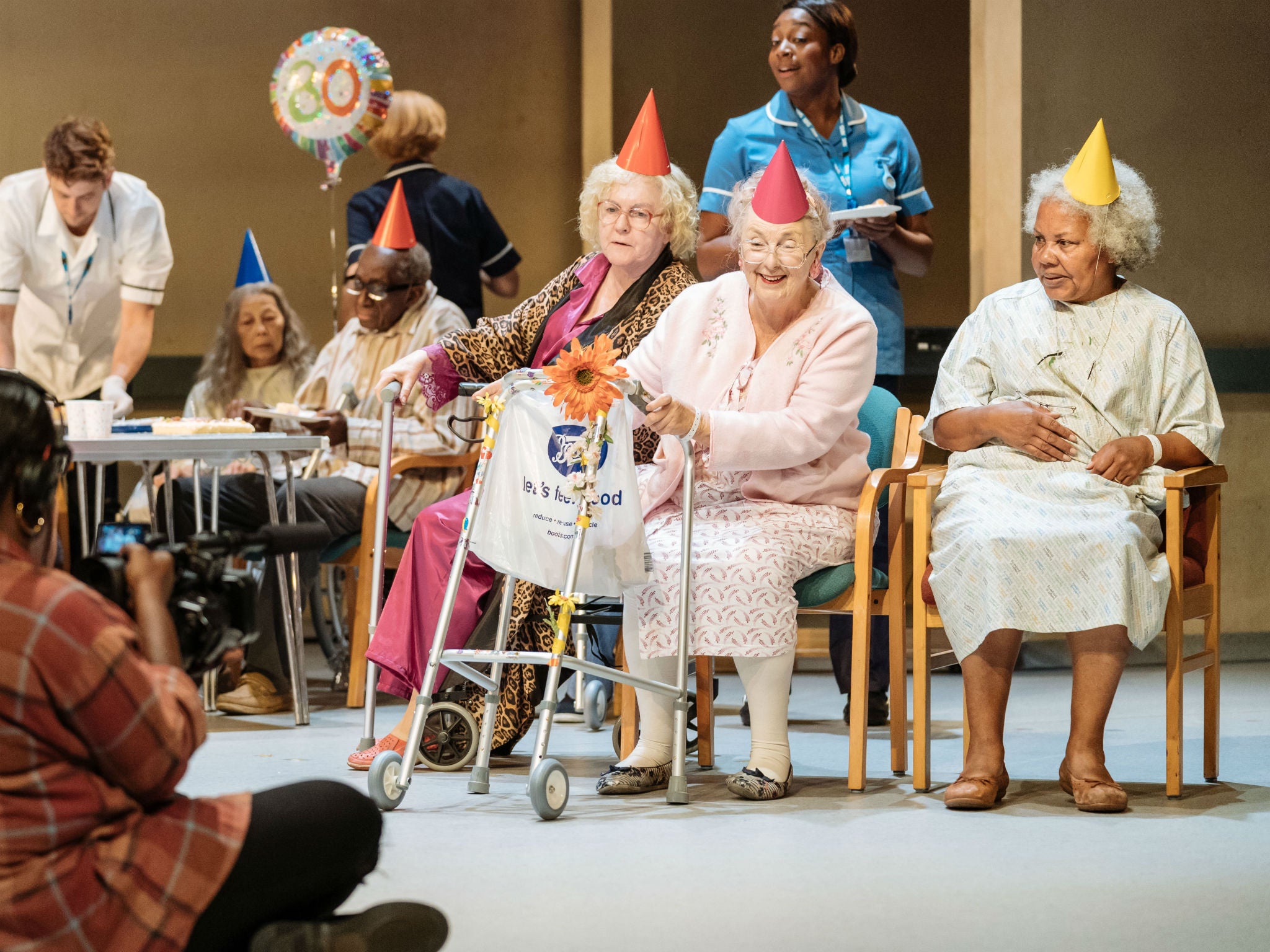Allelujah! Bridge Theatre, London, review: Alan Bennett's new NHS play is a surprisingly high-spirited occasion
This feels like a bonus treat from the 84-year-old: a play about our imperilled National Health Service that somehow leaves you bobbing on a wave of happiness

Your support helps us to tell the story
From reproductive rights to climate change to Big Tech, The Independent is on the ground when the story is developing. Whether it's investigating the financials of Elon Musk's pro-Trump PAC or producing our latest documentary, 'The A Word', which shines a light on the American women fighting for reproductive rights, we know how important it is to parse out the facts from the messaging.
At such a critical moment in US history, we need reporters on the ground. Your donation allows us to keep sending journalists to speak to both sides of the story.
The Independent is trusted by Americans across the entire political spectrum. And unlike many other quality news outlets, we choose not to lock Americans out of our reporting and analysis with paywalls. We believe quality journalism should be available to everyone, paid for by those who can afford it.
Your support makes all the difference.I think it’s fair to say this is the only play about our imperilled National Health Service from which I have departed bobbing on a wave of happiness. Or wishing I could somehow have resuscitated the late Judy Garland to be my guest for the evening. Yes, you read that correctly. My guess is she would have laughed her head off with delight at the singalong “Get Happy” finale.
Alan Bennett‘s 10th stage collaboration with director Nicholas Hytner is a cause for rejoicing, albeit qualified, in several respects. It’s the 84-year-old author’s first wholly new stage work since People in 2012, and it marks his debut at the Bridge Theatre – the handsome, thriving new Bankside venue that Hytner has created with Nick Starr.
The timing is perfect. The NHS will indeed be lucky if it receives a more enjoyably supportive 70th birthday present.
The piece is set in and around the geriatric wards of The Beth, an old-fashioned Yorkshire “cradle to grave” hospital under threat of closure under NHS efficiency drives. The hospital is beset by “bed-blocker” problems because council care homes are full and families are disinclined to cope.
A local TV crew are filming the campaign to save the place. Salter, chairman of the hospital trust – a wonderfully puffed-up Peter Forbes – is self-importantly garrulous in front of the cameras but prone to the odd revealing gaffe, as when he disparages a doctor who chose geriatrics because he likes old people by declaring: “Nobody likes old people. Old people don’t like old people – don’t put that in.”
Old people have always been to Bennett what daffodils were to Wordsworth; witness the marvellous parts he has written for veterans of the calibre of Thora Hird and Liz Smith. Among the 25 characters in this new piece we meet 12 patients played by such superb senior actors as Julia Foster, Jeff Rawle and Gwen Taylor.
In a bid to bring a bit of hope into their lives, a nurse has organised them into an ad hoc choir and one of the chief glories of the evening is song-and-dance routines encompassing everything from “’A’ You’re Adorable” to “Good Golly, Miss Molly”, that allow this doddery gaggle to evoke remembered happiness and the inner spirit that remains unquelled by infirmity, even if some of them are still tethered to their drip stands. These fantasy sequences are choreographed with a charming gentle poignancy by Arlene Phillips, the music beautifully arranged by George Fenton.
Hytner directs with his marvellous instinct for the signature interplay between revue-like whimsy and political subversiveness characteristic of Bennett’s work. Played with a lovely dour, deceptive resignation by Deborah Findlay, Sister Gilchrist doesn’t believe patients should stick around on the ward long enough to form a choir, and her methods for ensuring a brisk turnover take the logic of a targets-driven system to a reductio ad absurdum.
But to meet targets and make a profit – as The Beth has succeeded in doing – amounts to a disqualification for survival in the eyes of Samuel Barnett’s callous Colin. A local lad made good, and now the pet management consultant of the minister of health, he’s cycled up from London – the acceptable face of Lycra – to see his ailing ex-miner father. The improving health of the hospital doesn’t please him at all, as he asserts: “The state should not be seen to work. If the state is seen to work, we shall never be rid of it.”
The play abounds in such ironies – in Colin’s case thumped home a bit too stiffly for my liking. The one medic who feels genuine affection for his elderly patients is an immigrant doctor – attractively played by Sacha Dhawan – who faces deportation because his student visa is no longer valid and who is reprimanded for being too “hands-on”.
Until its last-minute shock revelation, the first half threatens to lapse into an anthology of Bennettisms – though it feels churlish to complain, given how choice they mostly are. “She was CofE but with all these vicars being had up, she went over to atheism,” snaps the daughter of a woman with dementia who repeatedly wails: “It was my house!”
Given its political diagnosis is not exactly cheering, and its recognition that “it isn’t death that has jaws, it’s life”, it is remarkable how Bennett’s humour and faith in the decency of ordinary people manage to make this an ultimately high spirited occasion. It feels like a bonus treat but I’m greedy, and hope there’s still more to come from this prodigious creative partnership.
Until 29 September (bridgetheatre.co.uk)
Join our commenting forum
Join thought-provoking conversations, follow other Independent readers and see their replies
Comments